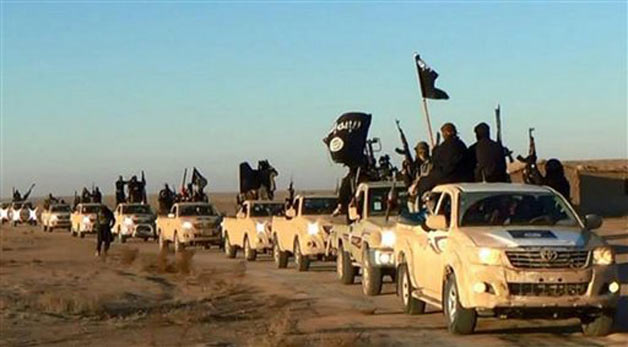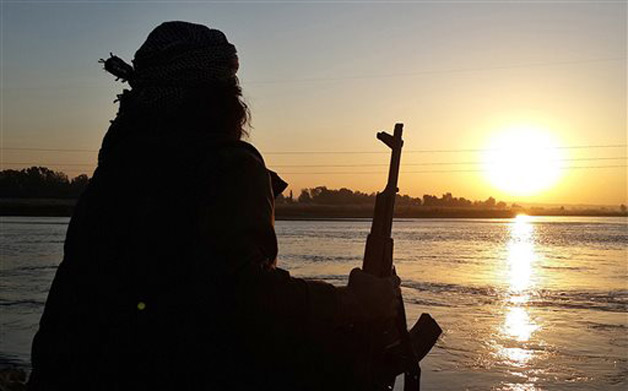The 28-year-old al-Homsi got a particularly large bonus because his marriage, which took place in April, brought in a useful new recruit: His wife, who goes by the nom de guerre of Umm Bilal, is a doctor and speaks four languages. He said she will be of service to the caliphate.
The AP has spoken with al-Homsi repeatedly over the past three years, when he started as an activist covering the fighting in his home city of Homs in central Syria. An IT specialist before the civil war broke out, al-Homsi reported prolifically on social media about the two-year siege of the city by Assad's forces and often briefed reporters.

He was always an ultraconservative Islamist, and he told AP he had supported IS as early as 2013. Being caught in the punishing siege of Homs turned him from an activist to a fighter. He was among the last die-hards who remained holed up in a Homs neighborhood blasted constantly by government troops. When the siege ended in a May 2014 truce, al-Homsi emerged hardened and has since been a member of the Islamic State group.
It was from his social media activity that he met his wife. From Tunisia, she admired his comments and briefings online.
"She has been an old follower of mine, during the siege," al-Homsi said with a slight smile.
After communicating with her through Skype and online, al-Homsi found out that her brother had joined the Islamic State group and was in the eastern Syrian city of Deir al-Zour.
As is customary for marriage, he went to ask her brother for her hand in marriage, he said.

The 24-year-old bride-to-be traveled through Algeria to Turkey, and from there to Raqqa with a group of other women joining IS. There, they were housed in a guesthouse for women which is also used as the headquarters for the IS female police corps known as the Khansa Squad.
"It is a luxury place, with a garden, A/C, nice furniture, like any apartment in Europe" so that immigrants don't feel estranged, said al-Raqqawi, the anti-IS media activist. Like others in his media collective, he uses a nickname for his security and doesn't specify his whereabouts.
In April, al-Homsi made the hazardous 150-mile (250-kilometer) journey from Homs to Raqqa to join her, bringing a recommendation from his local commander to prove his membership in IS.
It was rare marriage of a Syrian male fighter - an "ansari" as the group calls them - with a foreign migrant, or a "muhajira." The terms harken back to the time of Prophet Muhammad when he fled his home city of Mecca to the city of Medina to escape his opponents. His Meccan supporters who came with him were muhajireen, or "immigrants," and the Medina residents who welcomed them were ansaris, or "supporters."
Usually, foreign women marry foreign fighters in IS. Al-Homsi recalled the case of a French jihadi who was supposed to marry a French woman who came to join the group. He was killed in battle but he asked in his will that if that happened, his fiancee should marry his Swiss friend, al-Homsi said. She agreed.
During the few days of their honeymoon, al-Homsi and his bride enjoyed Raqqa's relative tranquility, riverside promenades and restaurants, staying in an apartment al-Homsi borrowed from a friend.
Then the couple travelled back to the countryside around Homs, where IS fighters are holding ground against Assad forces and rival rebel groups.
There, al-Homsi used the money from his grant to prepare a home for his new bride - and his four kittens, which he held up proudly in the Skype conversation with the AP. The couple is now expecting a new baby and hoping for a new cash injection with the childbirth, as the group can pay up to $400 as a bonus for each child.
For now the group provides him with a stipend of $50 a month and a similar amount for his wife, which he said are mainly for "entertainment."
Everything else is paid for: He gets an allowance for his uniform and clothes, some household cleaning supplies, and monthly food baskets worth $65.
It is the duty of the state, al-Homsi said, to care for the fighter's family while he is away battling to expand the caliphate. Soon after speaking to the AP, al-Homsi was back on the battlefield, among the fighters who took over the ancient city of Palmyra earlier this month.
"The fighter is on the front," al-Homsi said. "How will he bring food to the house?"

















